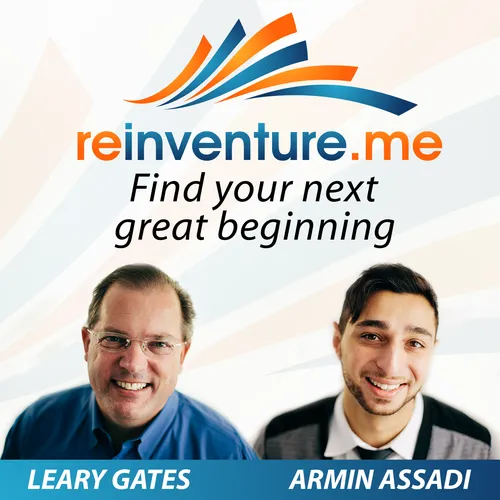035 Do you have a hunger for learning? How to create a personal learning plan
- Author
- [email protected] (What's next in life? | Explore your future with Leary Gates & Armin Assadi)
- Published
- Thu 18 Sep 2014
- Episode Link
- https://reinventure.me/035-do-you-have-a-hunger-for-learning-how-to-create-a-personal-learning-plan/
We might like to think we are lifelong learners. But how do we know if we’re are really learning as much as we could be? In this episode we discuss how to create a hunger for learning and how to develop a personal learning plan.

This episode’s Inspire Me quote is from Henry Ford:
“Anyone who stops learning is old, whether at twenty or eighty. Anyone who keeps learning stays young.”
We can push ourselves to excel in every dimension of life. How do we know, however, if we’re learning more than we did before? How do we know we are stretching ourselves, or settling at a plateau.
Leary ponders Proverbs 27:7, “He who is full loathes honey, but to the hungry even what is bitter tastes sweet.” Basically, it says there’s great benefit to hunger. We can learn from even the worst situations. And there’s an implied danger to be “full.” In that condition, we won’t even learn from the best of circumstances (“honey”). As Armin noted, that’s pride—and it goes before the fall.
So how do we increase our hunger? As with our hunger for food, we can either lower our intake and starve ourselves (not ideal), or increase our metabolism with exercise. That means we put ourselves on a program of intentional learning.
Leary drew a contrast between, what he called, intentional learning and utilitarian learning:
| Intentional Learning | Utilitarian Learning |
|---|---|
| Interest-driven | Needs-driven |
| Regularly done | Ad hoc |
| Mostly broad scope | Mostly narrow scope |
| Longer duration | Shorter duration |
| Multipurpose; unclear purpose | Singular purpose |
Neither is better than the other. We need both. The challenge is to not let today’s urgencies trump learning intentionally.
So how do you create a personal learning plan. That’s the Challenge Me for this episode. Leary shares the approach he’s taking. First, create a document and divide your plan into three sections, or areas of learning:
- Interests/Curiosities Areas of learning to stimulate your creativity. Think of these as your creative walkabouts.
- Professional development Areas of learning that can enhance your career, but, for which you are not looking for an immediate answer.
- Personal development Areas of learning to enhance your spiritual, relational, physical, and financial condition.
In each section answer the three questions:
- What sources of curriculum will I use? They could be books, magazines, blogs, videos, online course, formal courses, coaching, even teaching.
- What commitments will I make? Set a timetable for going through a chosen curriculum.
- What is a satisfactory measure of completion? What does graduation look like in your learning plan? How will you celebrate it?
The keys to intentional learning are to have a plan, create the space and habits necessary to support it, and to capture key learnings from it.
Resources mentioned or related to this podcast that may be helpful to you:
- Read Slowly to Benefit Your Brain and Cut Stress, Wall Street Journal, September 16, 2014
- How to be a better beginner, Episode 5 of Reinventure Me outlines 5 simple things to stretch your learning
- Why you should be a lifelong apprentice, Episode 7 of Reinventure Me share 4 reasons to stretch your learning through apprenticeship
- How to create habits for your next great beginning, Episode 21 of Reinventure Me will help you think about the best way to start a habit
- How reading can lead to your next great beginning, Episode 23 of Reinventure Me discusses 6 benefits of reading the old-fashioned way
- Leary’s Personal Learning Plan, Leary’s take-away action from the Challenge Me segment for this episode
- Armin’s Personal Learning Plan, Armin’s take-away action from the Challenge Me segment for this episode
